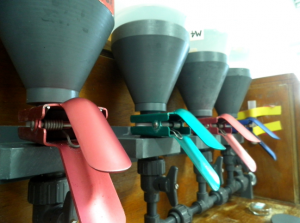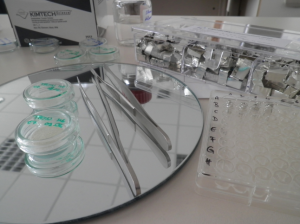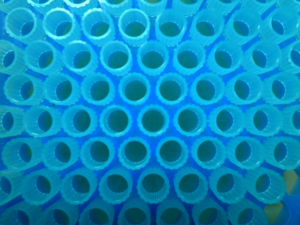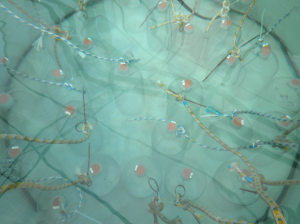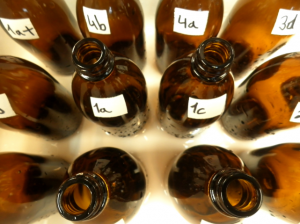Being a student assistant (HiWi) enables many insights into different side experiments and lots of interesting work that is going on during the KOSMOS project. Personally I think it is remarkable how fast and efficient people have worked on alternative experiments after the first storm.
Despite the low quality of my camera and my lacking experience in taking pictures I’d like to present some impressions I got in my daily work.
1) FILTRATION. In order to get information about chlorophyll concentrations and the elemental composition (carbon, nitrogen and phosphorus) in the biological material in each mesocosm, we filter seawater by means of this apparatus and a vacuum pump. Bottles were filled with sea water and are then put onto the hoppers you can see on this picture.
2) FOLDING FILTERS. After filtration of the samples, the filters with the phytoplankton on them were dried off and were folded to prepare them for further analyses. As the filters are very sensitive to contamination, it is important to work as cleanly as possible. Thus, you have to clean your work station with ethanol and let it dry before starting. Also, using a mirror as an underlay is very helpful, as you can see even small impurities as dust. After folding the filters, they are stored in small tin foil boxes (“Zinnschiffchen”) until they are analysed.
3) PIPETTING. The basic equipment of a biologist. Here you can see a bird’s eye-view of a box of pipette tips.
4) MAINTENANCE. That might sound more complicated than it actually is. One important thing in every experiment is to maintain an equal treatment of each sample, except for the variable you want to test. Here you can see the incubation system of one side experiment. All bottles are placed in one big tank. In order to get reliable results, you have to make sure that the certain position of a bottle within the tank does not affect your results. Therefore, we rotate of all bottles twice a day.
5) CLEANING. All bottles that are used for sampling, filtration and analyses must of course be cleaned at the end of the day. Depending on the analysing method you would use tap water, ultra-pure water (Milli-Q) or acid or a combination of all three.
